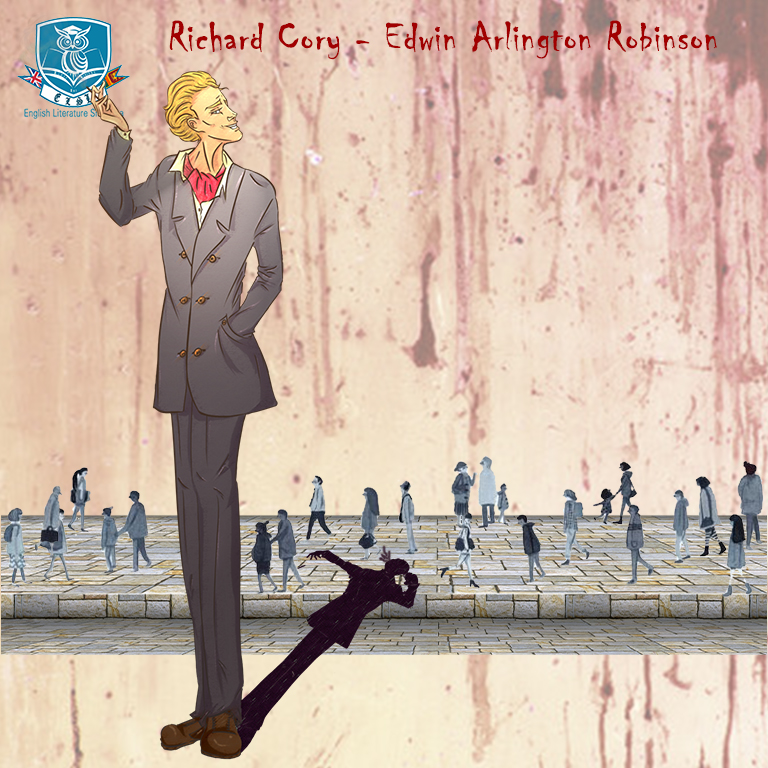
Richard Cory- Edwin Arlington Robinson
Whenever Richard Cory went down town,
We people on the pavement looked at him:
He was a gentleman from sole to crown,
Clean favored, and imperially slim.
And he was always quietly arrayed,
And he was always human when he talked;
But still he fluttered pulses when he said,
“Good-morning,” and he glittered when he walked.
And he was rich—yes, richer than a king—
And admirably schooled in every grace:
In fine, we thought that he was everything
To make us wish that we were in his place.
So on we worked, and waited for the light,
And went without the meat, and cursed the bread;
And Richard Cory, one calm summer night,
Went home and put a bullet through his head.
Richard Cory - Background
Edwin Arlington Robinson
Edwin Arlington Robinson is an American Modernist poet who contributed to world Literature between the late 19th and early 20th centuries. Once analyzed, his story of life concludes to be dreary and unhappy. Since his parents expected a female child, they were not so happy to accept him to the family, and even rejected to name him. He hated his name Edwin as it was given by a random stranger and Arlington, as it is the name of a city. The pessimistic view he had during the early years of his life makes most of his literary works to be downbeat and dark.
His Eldest brother Dean Robinson becomes a laudanum addict, the love of his life, Emma Löehen is married by his middle brother, Herman Robinson who ultimately ends up as a failure in his business; an alcoholic who is indifferent to his wife and children who dies penniless of tuberculosis.
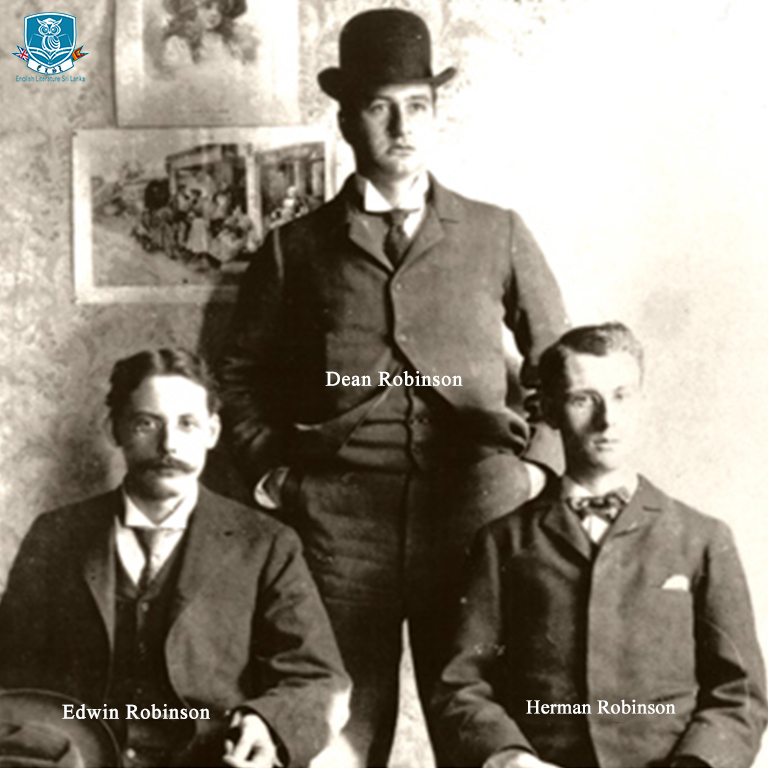
"Richard Cory"
The poem Richard Cory is based on the thoughts of Herman Robinson’s wife, Emma on her husband. It is composed during the panic of 1893 when the United States was suffering a severe economic depression, which is the very reason behind the tragic end of E.A Robinson’s lover’s husband. The “bread” functions as an allusion to the economic depression during which many survived by eating old bread.
‘Richard Cory’ is a based on the style of prose fiction as the content is fictitious and is revealed using vernacular language. At the same time, it functions as a lyric poetry as it is a formal poem in the first person narration which expresses ones tempestuous emotions.
The poem revolves around the one and only significant, masculine character called Richard Cory. The narrative voice casually exaggerates his judgement based on the appearance which ultimately concludes be a mere prejudice.
Richard Cory’ is a structured poem of four quartans. It is dominated by end-stops which is common in death/suicide poems. The narrator is a singular character who dwells on the pavement of ‘downtown’, yet projects a collective voice and opinion of the general working poor.
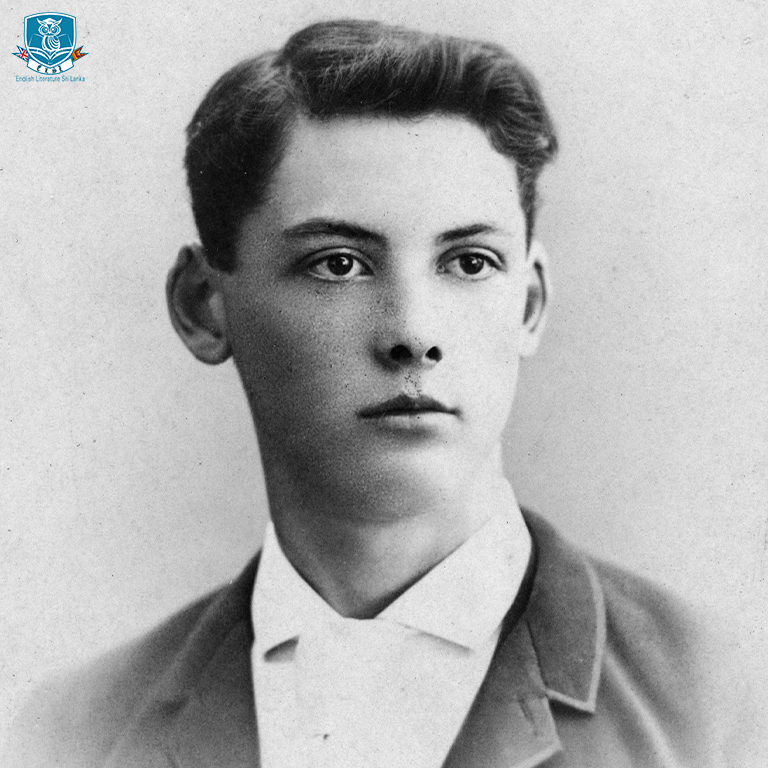
Young Edwin Arlington Robinson
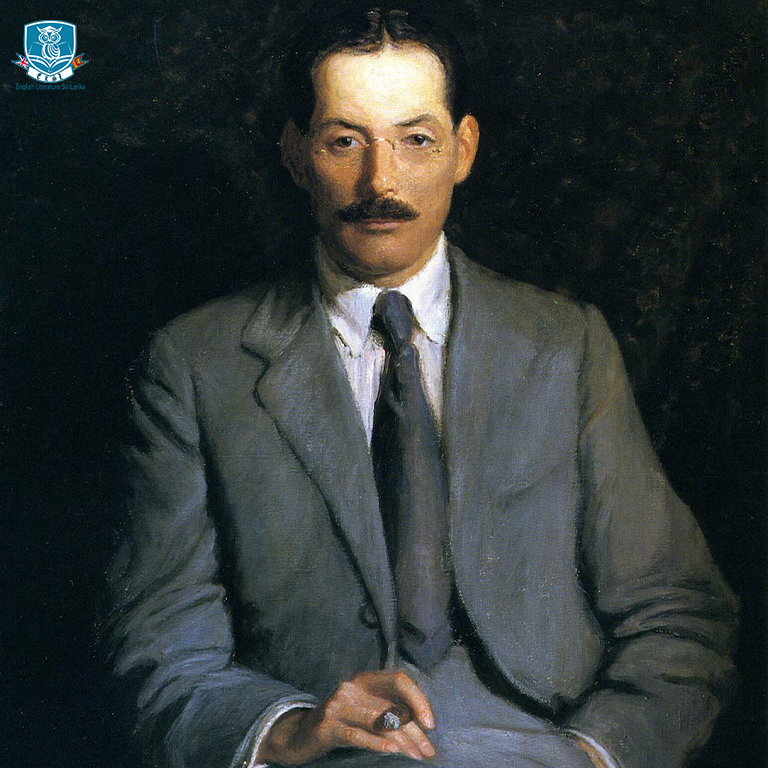
Edwin Arlington Robinson
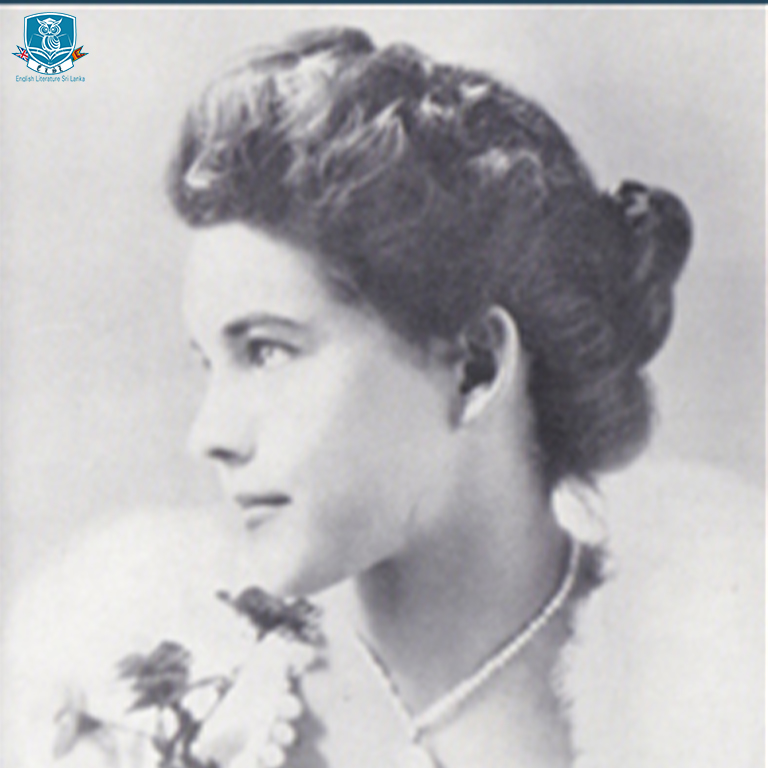
Emma Löehen
Topic
Richard Cory
- The topic of the poem is “Richard Cory”, and it sets a limitation that the literary work singularly revolves around the main character Richard Cory.
Stanza one
Line one
Whenever Richard Cory went down town,[a]
- ‘Whenever’ means ‘at whatever the time’ or ‘every time’. It suggests that Cory constantly goes ‘down town’
- Note the harsh consonant sounds associated with the name of the cynosure.
- ‘Went’ is a past tense verb, and it suggests that Cory no longer goes ‘down town’
- Down town is the commercial area of a city. The constant visits of Richard Cory to the central business area of the city suggests that he is a businessman.
Line Two
We people on the pavement looked at him:[b]
- “We people” indicates the collective voice represented by the 1st person narrator.
- The pavement on which “we people reside figuratively reveals their low standards of living.
- The pronoun ‘we’ generalizes the poverty-stricken community.
- The group of people looking at Richard Cory suggests that attempt to form an opinion on him.
Line Three
He was a gentleman from sole to crown,[a]
- The prevailing past tense affirms that ‘He’ no longer exists.
- The people on the pavement judges that Cory is a gentleman only by looking at him. In other words, their judgement is based on the appearance of Cory.
- Sole to crown suggests ‘from feet to head’.
- The ‘crown’ metaphorically refers to the apparent sovereign of the recipient whereas the homophonic pun of ‘sole’ relates to his ‘soul’.
- Note that the judgement of the people on the pavement is fundamentally based on what they see (Sole/Crown). Thus, the rudimentary judgement on Richard Cory is obvious, so it is better not to have higher expectations on him as a contradictory reality is eminent soon of the poem.
Line Four
Clean favored, and imperially slim.[b]
- ‘Clean favored’ means that Richard Cory appears to be neat and respectable.
- ‘Imperially’ denotes that Cory is redolent of a sovereign.
- The word ‘slim’ conveys that Richard Cory is gracefully thin, which enhances his visual appeal.
General outlook of stanza one
- The first stanza functions as a quatrain which has the standard ‘abab’ rhyming scheme
- The entire stanza is dominated by end-stops, which is unique for poems which have abrupt conclusions where the main character faces an unexpected death.
- The richness of the main character is one of the primary concerns of the stanza as the words ‘crown’, and ‘imperially’ relate to the concept.
- The stanza is dominated by harsh consonant sounds, which is another clue for the reader not to expect a better tomorrow.
- The tense of the entire stanza is past and the aspect is perfective; which figuratively suggests that Richard Cory no longer exists in the present of the speaker.
Stanza two
Line one
And he was always quietly arrayed,[a]
- The second stanza opens with the coordinating conjunction ‘and’ suggesting the reader that the elaboration of Richard Cory’s character continues.
- ‘quietly arrayed’ suggests that Richard Cory is not an extravagant character.
- There are two different reasons for Cory to be ‘quietly arrayed’. On the one hand, he is genuinely a modest character who does not want to show off his riches. Yet in a different perspective, it is possible to argue that he does not have any riches to showoff as his apparent modesty – is a metaphorical indication of his economical instability. Thus it indicates the contradiction between the prejudice of the people and the reality of Richard Cory.
Line two
And he was always human when he talked;[b]
- The anaphora of “and” suggests the excitement of the narrator to list out the exaggerative characteristic of the recipient.
- “and he was always” is a repetition which suggests the apparent consistency of the characteristics of Richard Cory.
- “Human” is a metaphor which refers to the down to earth character of Cory.
Line three
But still he fluttered pulses when he said,[a]
- “But still” suggests a contradictory idea to ‘he was always human when he talked’. ‘he was always human when he talked’ is a positive revelation on Cory’s character, thus ‘he fluttered pulses when he said’ is a negative connotation.
- However, there are two options for the ‘fluttered pulses’. It refers to the irregular heartbeats. Either of Richard Cory or of the people who talk to him.
- If Cory flutters pulses, it reveals his nervousness as he is not socially confident. In a different perspective, If he flutters pulses in the hearts of the people to whom he greets, it is simply because they are astonished by his glamour.
Line Four
“Good-morning,” and he glittered when he walked.[b]
- The only phrase Cory utters to the people is ‘Good-morning’. The lack of words said is a contradictory feature to Richard Cory’s down to earth character.
- ‘Good – morning” is a direct speech statement uttered by the recipient.
- ‘glittered when he walked’ is another addition to the elevated judgement of the people on Richard Cory.
General outlook of stanza two
- Perfective aspect and the past tense still dominates the overall stanza suggesting that the judgements on Richard Cory are no longer valid in the present.
- There is no change in the rhyming scheme as it suggests the monotony of the atmosphere and the characters of the poem.
- The overall stanza contains a significant number of coordinating conjunctions which suggest the excitement of the people to see and to interact with Richard Cory.
- Every line contains an end-stop which supports to indicate the idea of transience while maintaining the tension and unpredictability of the poem.
Stanza Three
Line one
And he was rich—yes, richer than a king—[a]
- The coordinating conjunction links the stanza to the previous syndeton.
- The conceptual repetition of Cory’s rich status contrasts him with the speaker who inhabits the pavement.
- The em dashes in the line remind the reader of the vernacular language of the poem. At the same time, they re-emphasize Richard Cory’s elevated materialistic possessions.
- The comparative style of the line reminds the reader about the rich standards of Cory in a hyperbolic manner.
Line two
And admirably schooled in every grace:[b]
- The anaphora re-appears in the stanza – and it indicates the peculiar interest and the excitement the ‘people on the pavement’ has on the materialistic prerogatives, the tangible as well as the abstract privileges Richard Cory experiences.
- Grace relates to the charming and attractive features of the recipient, and it seems his character is abundant of such.
- Regardless of the exaggerative account provided by the narrator; it should not be forgotten that the ‘people on the pavement’ judged Richard Cory based on the outer appearance.
Line three
In fine, we thought that he was everything[a]
- In fine is a synonym for ‘in short’ or ‘to sum up’.
- The caesura contributes to add emphasis to the figurative disappointment of the speaker as he has already come to a conclusion of the actuality of Richard Cory which is starkly different from his appearance.
- With the combination of the past tense and the word ‘thought’, the narrator reveals the contradiction between appearance and reality. The ‘people on the pavement’ ‘thought’ that Richard Cory ‘was everything’ but for some reason- they have now come to the realization that Cory is not what they expected him to be.
- This is the only line of the poem which does not end with a punctuation mark, and its meaning is extended to the next line.
Line four
To make us wish that we were in his place.[b]
- The final line of the stanza concludes why the ‘people on the pavement’ centralize their attention on Richard Cory. They aspire to be like Richard Cory, and they want to simulate his materialistic privileges.
- The subjunctive mood indicates the hope of the speaker to simulate the elevated standards and materialistic prerogatives of Richard Cory.
- ‘his place’ relates to the standards of Cory.
General outlook of stanza three
- Perfective aspect and the past tense still dominate the overall stanza suggesting that the judgements on Richard Cory are no longer valid in the present.
- There is no change in the rhyming scheme as it reveals the monotony of the atmosphere and the characters of the poem.
- The poet craftily handles punctuation marks to enliven the stanza and to add complexity to it.
Stanza Four
Line one
So on we worked, and waited for the light,[a]
- The focus shifts from Richard Cory to the ‘people on the pavement’ as the narrator describes how they worked hard to be materialistically privileged like Richard Cory.
- The pace of the line is significantly slowed down with the use of the caesura.
- ‘light’ is a metaphor for hope.
Line two
And went without the meat, and cursed the bread;[b]
- The coordinating conjunction ‘and’ repeats, and it indicates the emotional frustration of ‘we’.
- ‘meat’ is a symbol of the available privileges and the limited luxuries of the ‘people on the pavement’, and ‘bread’ is a symbol of the deprived status of their lives. However, they deliberately ‘went without meat’ and ‘cursed the bread’ as they wanted to be like Richard Cory.
- ‘bread’ further functions as a symbol of 1983 economic depression of America – during which many poverty-stricken people survived by eating old bread.
Line three
And Richard Cory, one calm summer night,[a]
- The coordinating conjunction ‘and’ functions as an anaphora, adding further emphasis to the traumatized emotional status of the narrator.
- The serenity associated with the word ‘calm’ highly contrasts with the chaotic suicide of Richard Cory.
- Summer is a symbol of youth. It suggests that Cory was in his youth when he ended his life.
- ‘Night’ is a general symbol of death and danger.
Line four
Went home and put a bullet through his head.[b]
- The narrator clearly illustrates the unexpected and the abrupt nature of Cory’s suicide by announcing is in the final line of the final stanza – leaving the reader dumbfounded and flummoxed.
- The incomprehensible action of Cory leaves both the reader and the narrator dumbstruck, so there are no explanations given for the cause of the suicide.
- ‘put a bullet through his head’ is a euphemism for Richard Cory’s inexorable suicide.
- the pace of the line is fast in contrast to the rest of the three lines above, of which the flow is interrupted by caesurae. It suggests how fast the tragedy struck Cory’s life.
General outlook of stanza four
- Perfective aspect and the past tense still dominate the overall stanza suggesting that the judgements on Richard Cory are no longer valid in the present.
- There is no change in the rhyming scheme as it suggests the monotony of the atmosphere and the characters of the poem.
- For the first time in the poem, the narrator shifts the focal point of the voice from Richard Cory to the ‘people on the pavement’.
- The stanza consists of a significant number of caesurae.
- The reading pace of the stanza is effectively controlled by the manipulation of punctuation marks.
- Each line of the stanza is end-stopped which supports the reader to predict the upcoming tragedy at the conclusion.
